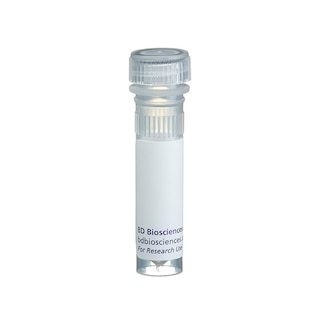-
Your selected country is
Middle East / Africa
- Change country/language
Old Browser
This page has been recently translated and is available in French now.
Looks like you're visiting us from {countryName}.
Would you like to stay on the current country site or be switched to your country?
BD Pharmingen™ Purified Hamster Anti-Human Bcl-2
(RUO)



Western blot analysis of Bcl-2. A Jurkat cell lysate (Human T-cell leukemia; ATCC TIB-152) was probed with the hamster anti-human Bcl-2 antibody at concentrations of 3.0 µg/mL (lane 1), 1.0 µg/mL (lane 2), and 0.5 µg/mL (lane 3). Bcl-2 can be identified as a band of ~ 26 kDa.


BD Pharmingen™ Purified Hamster Anti-Human Bcl-2

Purified Hamster Anti-Human Bcl-2
Regulatory Status Legend
Any use of products other than the permitted use without the express written authorization of Becton, Dickinson and Company is strictly prohibited.
Description
Bcl-2 is considered to be novel among proto-oncogenes because it blocks apoptosis (programmed cell death) in many cell types. Apoptosis is an active form of cellular suicide that typically requires new RNA and protein synthesis and is associated with distinct morphological changes including cell shrinkage, cytoplasm membrane blebbing, nuclear fragmentation and DNA degradation. The Bcl-2 gene was first found in t(14:18) containing follicular B-cell lymphomas. A high proportion of these lymphomas contains t(14:18) chromosomal translocations involving the human Bcl-2 gene. Translocation of Bcl-2 sequences from chromosome 18 onto the transcriptionally active immunoglobulin locus at chromosome band 14q32 in B-cells deregulates Bcl-2 gene expression, resulting in high levels of Bcl-2 mRNA and protein expression. Because Bcl-2 blocks apoptosis it may contribute to tumorigenesis by prolonged cell survival rather than by accelerating the rate of cell proliferation. The reduced molecular weight of Bcl-2 is 26 kDa. Additional minor bands at 27-31 kDa and 18-21 kDa may also be observed.
Preparation And Storage
Store both the hamster anti-human Bcl-2 antibody (component 51-1513GR) and the Jurkat cell lysate (component 51-16526N) undiluted at -20°C.
Recommended Assay Procedures
Western blot: Please refer to http://www.bdbiosciences.com/pharmingen/protocols/Western_Blotting.shtml
Product Notices
- Since applications vary, each investigator should titrate the reagent to obtain optimal results.
- Please refer to www.bdbiosciences.com/us/s/resources for technical protocols.
- Although hamster immunoglobulin isotypes have not been well defined, BD Biosciences Pharmingen has grouped Armenian and Syrian hamster IgG monoclonal antibodies according to their reactivity with a panel of mouse anti-hamster IgG mAbs. A table of the hamster IgG groups, Reactivity of Mouse Anti-Hamster Ig mAbs, may be viewed at http://www.bdbiosciences.com/documents/hamster_chart_11x17.pdf.
- Caution: Sodium azide yields highly toxic hydrazoic acid under acidic conditions. Dilute azide compounds in running water before discarding to avoid accumulation of potentially explosive deposits in plumbing.
- Source of all serum proteins is from USDA inspected abattoirs located in the United States.
Companion Products




| Description | Quantity/Size | Part Number | EntrezGene ID |
|---|---|---|---|
| Purified Hamster Anti-Human Bcl-2 | 50 µg (1 ea) | 51-1513GR | N/A |
| Jurkat Cell Lysate | 50 µg (1 ea) | 51-16526N | N/A |
Development References (13)
-
Batistatou A, Merry DE, Korsmeyer SJ, Greene LA. Bcl-2 affects survival but not neuronal differentiation of PC12 cells. J Neurosci. 1993; 13(10):4422-4428. (Biology: Immunofluorescence, Western blot). View Reference
-
Chiou SK, Rao L, White E. Bcl-2 blocks p53-dependent apoptosis. Mol Cell Biol. 1994; 14(4):2556-2563. (Biology: Western blot). View Reference
-
Hockenbery D, Nuñez G, Milliman C, Schreiber RD, Korsmeyer SJ. Bcl-2 is an inner mitochondrial membrane protein that blocks programmed cell death. Nature. 1990; 348(6299):334-336. (Immunogen: Immunofluorescence, Western blot). View Reference
-
Hockenbery DM, Oltvai ZN, Yin XM, Milliman CL, Korsmeyer SJ. Bcl-2 functions in an antioxidant pathway to prevent apoptosis. Cell. 1991; 75(2):241-251. (Biology: Immunofluorescence). View Reference
-
Hockenbery DM, Zutter M, Hickey W, Nahm M, Korsmeyer SJ. BCL2 protein is topographically restricted in tissues characterized by apoptotic cell death. Proc Natl Acad Sci U S A. 1991; 88(16):6961-6965. (Biology: Immunohistochemistry, Immunoprecipitation). View Reference
-
Martin JM, Veis D, Korsmeyer SJ, Sugden B. Latent membrane protein of Epstein-Barr virus induces cellular phenotypes independently of expression of Bcl-2. J Virol. 1993; 67(6):5269-5278. (Biology: Flow cytometry, Western blot). View Reference
-
McDonnell TJ, Nunez G, Platt FM, et al. Deregulated Bcl-2-immunoglobulin transgene expands a resting but responsive immunoglobulin M and D-expressing B-cell population. Mol Cell Biol. 1990; 10(5):1901-1907. (Biology: Western blot). View Reference
-
Nguyen M, Millar DG, Yong VW, Korsmeyer SJ, Shore GC. Targeting of Bcl-2 to the mitochondrial outer membrane by a COOH-terminal signal anchor sequence. J Biol Chem. 1993; 268(34):25265-25268. (Biology: Immunofluorescence, Western blot). View Reference
-
Núñez G, Merino R, Grillot D, González-García M. Bcl-2 and Bcl-x: regulatory switches for lymphoid death and survival. Immunol Today. 1994; 15(12):582-588. (Biology). View Reference
-
Oltvai ZN, Milliman CL, Korsmeyer SJ. Bcl-2 heterodimerizes in vivo with a conserved homolog, Bax, that accelerates programmed cell death. Cell. 1993; 74(4):609-619. (Biology: Immunoprecipitation, Western blot). View Reference
-
Veis DJ, Sentman CL, Bach EA, Korsmeyer SJ. Expression of the Bcl-2 protein in murine and human thymocytes and in peripheral T lymphocytes. J Immunol. 1993; 151(5):2546-2554. (Biology: Flow cytometry, Western blot). View Reference
-
Yang E, Zha J, Jockel J, Boise LH, Thompson CB, Korsmeyer SJ. Bad, a heterodimeric partner for Bcl-XL and Bcl-2, displaces Bax and promotes cell death. Cell. 1995; 80(2):285-291. (Biology: Immunoprecipitation, Western blot). View Reference
-
Yin XM, Oltvai ZN, Korsmeyer SJ. BH1 and BH2 domains of Bcl-2 are required for inhibition of apoptosis and heterodimerization with Bax. Nature. 1994; 369(6478):321-323. (Biology: Immunoprecipitation, Western blot). View Reference
Please refer to Support Documents for Quality Certificates
Global - Refer to manufacturer's instructions for use and related User Manuals and Technical data sheets before using this products as described
Comparisons, where applicable, are made against older BD Technology, manual methods or are general performance claims. Comparisons are not made against non-BD technologies, unless otherwise noted.
For Research Use Only. Not for use in diagnostic or therapeutic procedures.
Report a Site Issue
This form is intended to help us improve our website experience. For other support, please visit our Contact Us page.